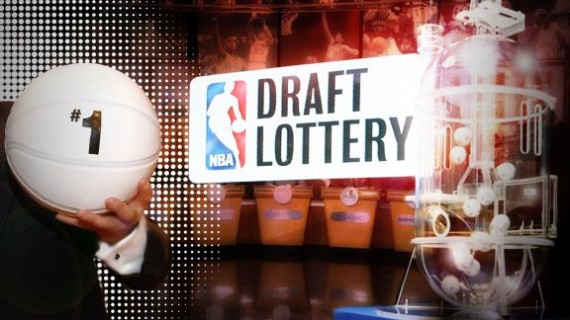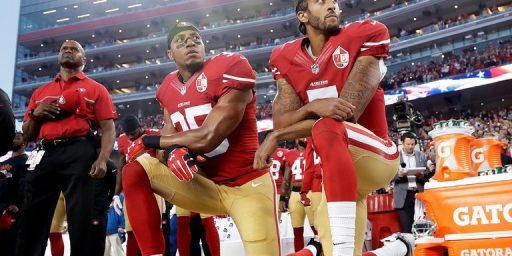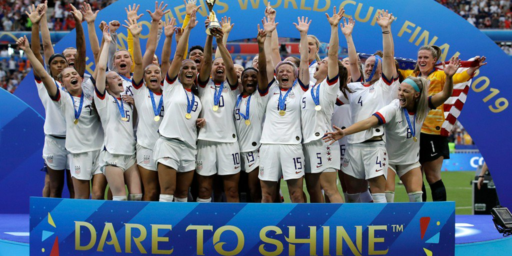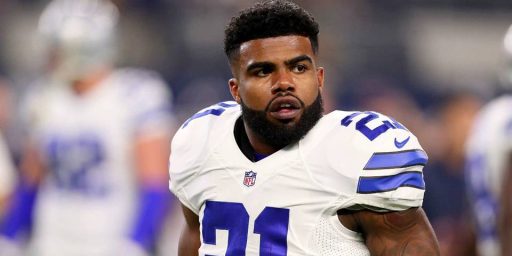Fixing the NBA Draft
"Tanking" to improve draft position has plagued the NBA for years. The solution is obvious.
FiveThirtyEight’s Jody Avirgan asks, “Can YOU Fix The NBA Draft?”
The NBA draft could use some fixing. Whether NBA Commissioner Adam Silver admits it or not, teams are tanking in order to land a better chance at a top pick. On the most recent episode of our sports podcast Hot Takedown, we discussed a few proposals to fix the draft structure, from the “wheel” to closing the gap between the worst and second-worst team’s chances. Now, it’s your turn.
When you’re sitting on your couch, daydreaming, what crazy scheme have you come up with to fix the draft structure?
You’re invited to submit your own plan at the link.
Mine’s pretty simple: Eliminate the draft entirely.
First, the draft is inherently immoral. Prospects give up their right to chose for whom to work and the right to negotiate terms of their employment outside very narrow parameters as a prerequisite for the right to work in the cartel. To be sure, it’s collectively bargained between the owners and the players union, but the union pointedly doesn’t include those subject to the draft. Consequentially, they’ve negotiated a deal that artificially lowers the earnings of the best new talent for their initial years in the league, thus shifting more of the wages to those already in the union.
Second, the draft has the perverse effect of rewarding teams for losing games and dumping valuable assets. The worst current teams, the Philadelphia 76ers and New York Knicks have not only traded away their best older players—which is absolutely rational for teams not close to contending for a championship—but have systematically dumped their best young players in a quest to get to the top of the draft. That’s bad for the league and bad for the fans of those teams. (Oddly, the other contender for the worst team in the league, the Minnesota Timberwolves, have gone in the other direction. They traded away their best player, Kevin Love, rather than lose him in free agency but got a king’s ransom in young talent and draft picks in return.)
Absent a draft, weak teams would have an incentive to work towards improvement in order to draw fans to the arena. They would still play for the future, jettisoning older players and stockpiling prospects, but they would play their best young players and try to get better. The premium would be on player development, rather than winning games per se, but the nature of the sport is that they’d nonetheless win a lot more than 16 or 17 out of 82 games if they weren’t intentionally tanking.
Essentially, you’d have the college system. Teams with a history of winning, good coaches, and a reputation for sound talent management would have a leg up on attracting free agent talent, including kids coming out of school. But the salary cap would continue to limit the ability of the best teams to stockpile talent. And a desire for playing time would give teams weak at a given player’s position an advantage, preserving much of the competitive balance aspect of the draft system. A team with multiple stars probably isn’t going to get the guys who would now be “lottery picks,” for the same reason that they don’t attract “max contract” guys in free agency: the best players want as much playing time and money as possible, and weaker teams are more likely to have those available.






The draft is only a minor symptom of the franchise system. Nowhere else in the world do sports teams tank – because they get demoted to the minors of they do. Talk about an incentive not to lose if otherwise you play with the Toledo Mudhens next year.
I agree with you James. The best way to fix the draft is to do away with it. This still does not address the real problem in the NBA – there are wealthy teams and not so wealthy teams. Here in Portland the Trailblazers are owned by the 4th or 5th wealthiest man in the world, Paul Allen. The team always sells out. In the case of Allen the salary cap doesn’t always work He has shown a willingness to pay the fines associated with exceeding the salary cap. When he told the city he needed a new venue the reaction of the city was OK then build one. The city did give him the land. The venue itself has been a real money maker for him.
A few hours up I5 the story is a little different. OKC business man Clay Bennet bought the Seattle SuperSonics in 2006. Everyone knew his intention was to move the team to OKC. When the city of Seattle refused to build him a new venue he did just that. The first couple of years thanks to the the good management of the old Supersonics team they did OK but still could not fill the stands. The team quickly went from a playoff contender to an also ran which resulted in even fewer fans in the stands. The team is hemorrhaging money. Bennet does not have the deep pockets of Paul Allen so there are limits as to what he can do.
This is a story of the have and have nots and is repeated throughout the league. I don’t really know how you deal with this.
I heard this proposal for the NHL draft, where tanking has been rampant this year as well. Instead of first pick going to the worst team, or the worst team gets the best odds in a weighted lottery, first pick goes to the team who gets the most wins after they are eliminated from the playoffs.
James, I think that is why we will never get rid of a draft, simple inertia. Even in the same paragraph where you are talking about getting rid of the draft you are still talking about draft picks as a valuable commodity.
@Mu: I love the idea of relegation, but would we have to call New York a minor league town after the Mets, Knicks, and Islanders all got sent down in recent years?
@Pete S: Yes
I don’t want to defend the draft, but the NBA probably needs little help in its business model from anyone. Since 2001 to 2014, league revenue has grown from $2.6 to $4.7 billion dollars while the price of a franchise has grown from $220 million to more than a billion. They are doing pretty good.
Relegation is one of those things that sounds great until you think about it for more than a minute. It wouldn’t really work with US professional sports the way it does with, say, the English football leagues. First of all, none of the four major sports leagues has a minor league anywhere close to the quality of the top major league teams. In relegation leagues, the quality is reasonably comparable. Second, In many cases, the minor league teams are OWNED by the major league teams and used as farm systems, not as real competitive teams. You think the Tigers are going to invest in making Toledo a competitive team?
Third, a major sports franchise is a multi-hundred million dollar enterprise. No league is going to accept a system where there hundred million dollar payroll and half a billion dollar stadium is relegated. No city will accept that. No minor league city is prepared to put forward major league facilities. You think the Fort Wayne Mad Ants are ready to host the Lakers? You think they can invest the hundreds of millions to be ready?
What you could do, possibly, is divide the existing league into two tiers, only the top of which contends for a title. But that, of course, eliminates the possibility of worst-to-first teams like we see in the NFL and MLB.
@Pete S:
EDMONTON GOT CONOR MCDAVID!? KILL THE DRAFT. KILL IT WITH FIRE.
Seriously, I like the proposal that bases draft position on some variation of “points earned after elimination”. Eliminates outright tanking while still allocating talent where it is most needed. It would also inject some meaning into late season games between previously eliminated opponents. Not perfect, but I can’t bring myself to agree with the alternative of the recruitment system.
One problem with eliminating the draft — an idea I like: it would accelerate the recent trend of teams trading players and immediately dumping them to free up cap space.
I’m sorry James, but you’re completely and utterly wrong on this. Basketball players have proven time and time again that when they are unrestricted free agents, the top players always go to either warm-weather teams, or to New York City. And that’s it.
Look at the Boston Celtics. They’ve won a ridiculous amount of titles, have an established legacy of winning, have rich owners willing to spend whatever it takes regardless of the luxury tax, and a GM in Ainge who is considered one of the better GMs in the league.
But they’ve NEVER been able to sign a top-level free agent in the entire history of the franchise. Every single very-good-to-great player they’ve ever had was either drafted by them or traded for. Free agents don’t care about winning legacies or shrewd front offices. They don’t want to go to Boston because it’s cold and it doesn’t have the nightlife and endorsements of NYC. That’s literally the entire calculus to them. It’s dumb, it sucks, but it’s the truth.
The only exception to this is LeBron choosing to go back to Cleveland this past summer, but that is a special case, since he grew up in Cleveland, was drafted by them, and played there for 7 years before leaving for Miami.
All your system will do is make sure that the southern teams (and NYC) will get all of the best prospects no matter what, and the northern teams will be completely screwed in the draft and lose the only hope they have of getting better.
First, the draft is inherently immoral. Prospects give up their right to chose for whom to work and the right to negotiate terms of their employment outside very narrow parameters as a prerequisite for the right to work in the cartel.
This completely ignores the quasi-socialist business of professional sports. The Los Angeles Lakers can’t sell out arenas 82 times a year for intra-squad scrimmages. They need other teams and other franchises. They are athletically competitive but they are economically symbiotic, if not out right cooperative.
If I want to go to work for IBM, should I be able to choose which division of the company will hire me?
Mike
Not much of a basketball fan here, but in baseball the quid pro quo of the draft and years of team control is that baseball farm leagues are training leagues. The best-run ones are training players to take jobs in the major league when they’re ready. This may be different from basketball and football where college sports plays a more prominent role in developing and seasoning talent. No sports or business organization will invest much in job training if the employee can leave at will. Or more precisely, the extent of job training will be proportional to the benefit to the employer.
@Slugger: They business model doesn’t need help in the short run, but is it actually good forever? Half the franchises build on a win now, mortgage the future model. Sometimes that works (see Miami and the big three hire), sometimes it doesn’t (Redskins 1999 and counting). The biggest problem for the franchise system is to keep people believing they’re seeing sport, not a scripted WWE event.
My suggestion to fix tanking would not be to eliminate the draft but to hit them where it hurts, profits. Make the share of the TV money depending on your performance, if every loss cost you $1,000,000, teams will start thinking about staying competitive.
I would “fix” the draft in the following manner:
Keep the current system of seeding the teams for the draft, and add to that a 2nd level that allows for a completely random draw of teams, so that many players would be drafted by two teams.
Imagine if say Anthony Davis had been drafted by New Orleans in the “regular” draft, and by Chicago in the” random draft”? There would have been some choice there. And I believe it could strongly offset the tanking factor.
Why does this happen?
This sounds like a problem of competitive balance. Three teams winning about 21% of their games during the course of the year doesn’t sound like tanking. It sounds like they suck. Baseball is more competitive with the worst team usually winning 40% of the time, and football has a shorter season with a generous post-season opportunity.
If “tanking” means not playing well at the end of the season (below true talent) then the “value” of losses could be spread differently across the season. If “tanking” means the team is simply poorly constructed, its hard to see the benefit of preventing them from changing their players. If “tanking” is the eventual result of what Mu calls a “win now, mortgage the future model,” maybe it should be harder to execute that model in the first place.
@Ron Beasley:
That’s kinda a misrepresentation of the OKC story: they had bad luck with injuries, but their core is probably one the top 3 talent pools in the NBA. OKC is also one of the more profitable teams out there (and of course, profits don’t matter that much: the value of NBA teams keeps appreciating, so what one loses in a decade can be recuperated with a sell).
My own solution to the draft problem: make it so no team can win one of the first 3 slots more than once in 3 years. This way, if you hit on a first 3 pick, and then win the lottery again, you are bumped back, and not rewarded for incompetence.
@Mu: I like relegation in theory but agree with @Hal_10000 that it’s unworkable in practice.
@Ron Beasley: Aside from instituting a hard cap, as the NFL has, I don’t see how you fix that.
@Pete S: Ha. I’ve fixed it. I agree that it’s integral to American professional sports and hard to conceive of not having it.
@Ben: Boston seems to be a unique case in that there’s a longstanding feeling that it’s a racist sports town and black players are reluctant to sign there. It’s hard to think of true superstar players who’ve gone to cold weather towns. Google gives me Gilbert Arenas to the Wizards in 2003, Carlos Boozer to the Jazz in 2004, and Chauncey Billups to the Pistons in 2002. Moses Malone and others went to cold weather teams in the more distant past.
The NBA is really odd in this, in that, for example, the Patriots have no trouble signing free agents even though they’re not known for spending big. Ditto Green Bay, Minnesota, and Chicago. Even Buffalo, which is both extremely cold and hasn’t been a winning team in decades, gets plenty of free agents.
@MBunge: The NBA is a league, not a single business. But even those who go to work for an individual corporation can generally choose which of their cities they want to work.
@PD Shaw: Part of it is simply that the teams suck. Part of it is the nature of basketball, where a bad team can beat a good one on any given night, and part of it is the nature of the NBA schedule, where a great team might play three games in three nights and lose to a bad, fresh team.
Eliminating the draft would lead to consolidation around four or five of the largest markets within a few years. That would be bad for players and fans since a majority of players would be out of a job and a majority of fans would see “their’ team evaporate. The league would probably be forced to either go the WWE route or re-introduce the draft to maintain interest.
If you really want to fix the problem then eliminate public subsidy of stadiums. That will drastically reduce the amount of money teams have for payroll and force teams to be more competitive in order to sell tickets.
@Al:
How? Every team would have exactly as much money to spend and as many roster spots as they do now. There are more fantastic new players coming out of school every year than there are available openings. You’re saying most of these people would chose whatever their second option is rather than play for the NBA if they couldn’t get a job with one of the top 5 teams?
At the college level, programs are getting more, not less, competitive and there’s no draft there. Duke has to compete against dozens of other teams for the best players, most of whom don’t chose Duke.